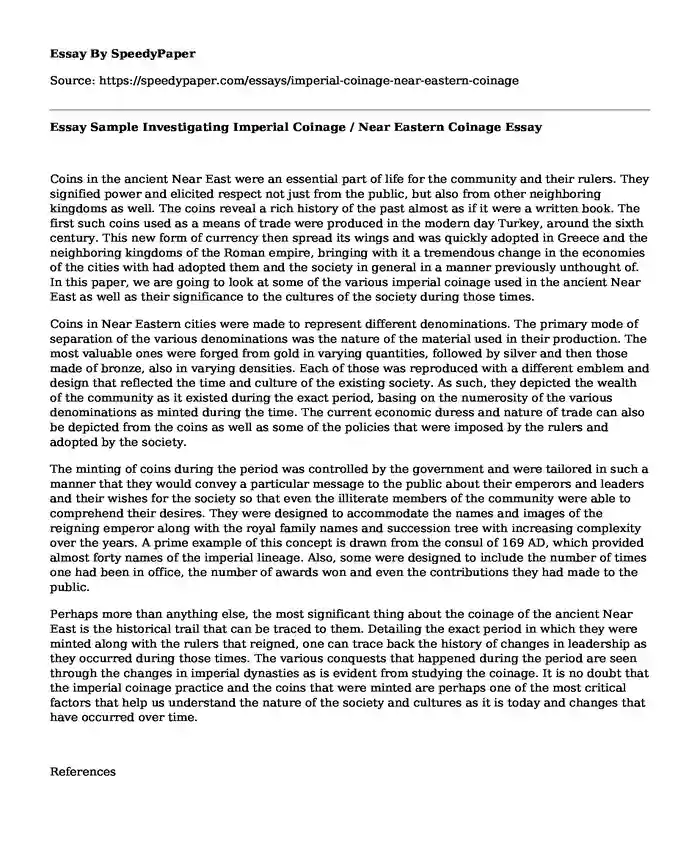Coins in the ancient Near East were an essential part of life for the community and their rulers. They signified power and elicited respect not just from the public, but also from other neighboring kingdoms as well. The coins reveal a rich history of the past almost as if it were a written book. The first such coins used as a means of trade were produced in the modern day Turkey, around the sixth century. This new form of currency then spread its wings and was quickly adopted in Greece and the neighboring kingdoms of the Roman empire, bringing with it a tremendous change in the economies of the cities with had adopted them and the society in general in a manner previously unthought of. In this paper, we are going to look at some of the various imperial coinage used in the ancient Near East as well as their significance to the cultures of the society during those times.
Coins in Near Eastern cities were made to represent different denominations. The primary mode of separation of the various denominations was the nature of the material used in their production. The most valuable ones were forged from gold in varying quantities, followed by silver and then those made of bronze, also in varying densities. Each of those was reproduced with a different emblem and design that reflected the time and culture of the existing society. As such, they depicted the wealth of the community as it existed during the exact period, basing on the numerosity of the various denominations as minted during the time. The current economic duress and nature of trade can also be depicted from the coins as well as some of the policies that were imposed by the rulers and adopted by the society.
The minting of coins during the period was controlled by the government and were tailored in such a manner that they would convey a particular message to the public about their emperors and leaders and their wishes for the society so that even the illiterate members of the community were able to comprehend their desires. They were designed to accommodate the names and images of the reigning emperor along with the royal family names and succession tree with increasing complexity over the years. A prime example of this concept is drawn from the consul of 169 AD, which provided almost forty names of the imperial lineage. Also, some were designed to include the number of times one had been in office, the number of awards won and even the contributions they had made to the public.
Perhaps more than anything else, the most significant thing about the coinage of the ancient Near East is the historical trail that can be traced to them. Detailing the exact period in which they were minted along with the rulers that reigned, one can trace back the history of changes in leadership as they occurred during those times. The various conquests that happened during the period are seen through the changes in imperial dynasties as is evident from studying the coinage. It is no doubt that the imperial coinage practice and the coins that were minted are perhaps one of the most critical factors that help us understand the nature of the society and cultures as it is today and changes that have occurred over time.
References
Brennan, Peter. & Turner, Michael. & Wright, Nicholas L. & Nicholson Museum. (2007). Faces of power: imperial portraiture on Roman coins. University of Sydney, N.S.W: Nicholson Museum
Cite this page
Essay Sample Investigating Imperial Coinage / Near Eastern Coinage. (2022, May 20). Retrieved from https://speedypaper.net/essays/imperial-coinage-near-eastern-coinage
Request Removal
If you are the original author of this essay and no longer wish to have it published on the SpeedyPaper website, please click below to request its removal:
- Essay Example on Suggested Seizure Treatment
- Movie Analysis Essay Example
- Aging Surfer Case Essay
- Free Essay on the Vision of a Future Physical Therapist
- Essay Sample with the Research Proposal Evaluation
- Interpretive Essay Example on the Song of the Scaffold
- Essay Sample: Frederick Douglass on What It Means to be Fully Human
Popular categories





